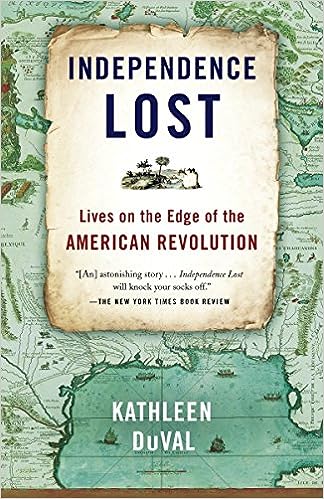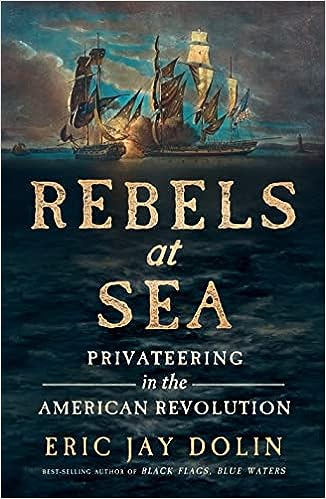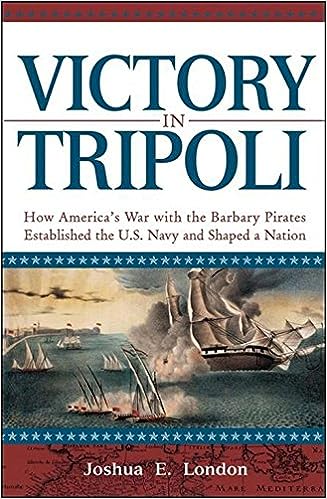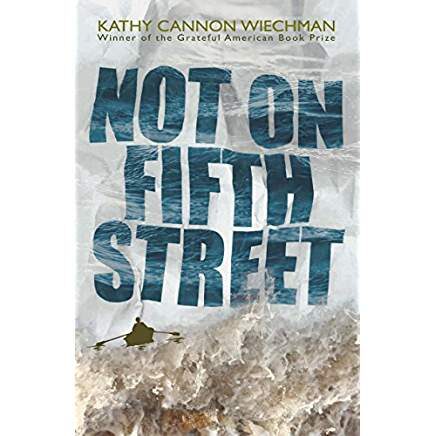Books on lesser-known aspects of American history
Guest Post by Jordan Baker
The parts of history that interest me the most have always been the events, people, and eras you don’t learn about it in school. Though we all take American history as part of the core curriculum growing up, there’s so much about that history that we don’t cover. And this is especially true of early American history.
Luckily, there are tons of great Books on American History out there to help fill in the gaps. In this post, I’ll explore five of my favorite books on early American history, ranging chronologically from the Revolution to the Jefferson presidency.
Each of these books presents a fascinating glimpse into lesser-known aspects of pivotal eras in American history, from the role of marginalized people, the impact of piracy, and an attempt or two at treason!
Independence Lost
 Independence Lost: Lives on the Edge of the American Revolution is a fascinating book by Kathleen DuVal, Professor of History at UNC-Chapel Hill.
Independence Lost: Lives on the Edge of the American Revolution is a fascinating book by Kathleen DuVal, Professor of History at UNC-Chapel Hill.
In this work, DuVal explores the impact of the American Revolution outside of the 13 rebelling colonies. To do this, she focuses on the experiences of people whose experience of the Revolution often goes untold: women, slaves, loyalists, and Native Americans.
To tell this story, DuVal assembled a fantastic cast of characters. We meet the Choctaw leader named Payamataha and the half-Scottish, half-Creek Alexander McGillivray. Both of these men were influential in their respective Nations and sought to protect their people against further Euro-American encroachment.
We also get to know a man named Petit Jean, a slave living in Mobile (then part of the Spanish Empire). Despite his status as a slave, Petit Jean made important and last contributions to the American side of the fight. In his story, we see the agency enslaved peoples were able to win for themselves on the border of the empire.
While these were the people and stories that stood out most to me, DuVal also does a magnificent job of exploring the lives of many more fascinating people.
Rebels at Sea
 Written by renowned maritime historian and author Jay Dolin, Rebels at Sea: Privateering in the American Revolution tells the story of the rebelling colonies’ unlikely source of naval power.
Written by renowned maritime historian and author Jay Dolin, Rebels at Sea: Privateering in the American Revolution tells the story of the rebelling colonies’ unlikely source of naval power.
When the American Revolution, the states and the Continental Congress all knew there was no way they could match Britain’s naval power with a navy of their own. They did begin construction of a small naval fleet, but Britain had warships patrolling the seas from America to the Caribbean, from England to India, and back again.
But, American leaders knew if they were going to have a shot at winning independence, they’d have to at least weaken the world’s strongest navy. To that end, Congress and the states began issuing letters of marque to merchant ships that sailed out of ports up and down the new country’s extensive coastline.
Turning themselves into the respectable cousins of pirates, these newly minted privateers attacked British shipping interests across the Atlantic, bringing in money and military supplies to the young revolution.
Though this is a fascinating enough story in its own right, Dolin is a gifted writer and researcher, who can bring the historical actors and their exploits to life. h
The First Conspiracy
 The First Conspiracy: The Secret Plot to Kill George Washington is the incredible, but true story of a plot against the American commander-in-chief engineered by high-ranking British officials in the early months of the Revolution.
The First Conspiracy: The Secret Plot to Kill George Washington is the incredible, but true story of a plot against the American commander-in-chief engineered by high-ranking British officials in the early months of the Revolution.
Co-authored by the thriller novelist Brad Metzler and documentarian Josh Mensch, The First Conspiracy reads like a novel despite being a non-fiction account of these dramatic events. The pair of authors masterfully weaves together the experiences of men from across the colonies, from George Washington and Governor William Tryon to common soldiers and would-be criminals, before bringing them all into a fascinating collision.
Along the way, Metzler and Mensch provide the backstory for the key players and events that The First Conspiracy unravels. Their ability to seamlessly weave this information into their story makes the book even richer.
The First Conspiracy’s thriller-like pace and excellent, accessible explanation of the events of the American Revolution’s early years make it an excellent read for history buffs and history newcomers alike.
The Three-Cornered War
 The Three Corner War: The Union, the Confederacy, and Native Peoples in the Fight for the West, shows just how much of an impact the Civil War had on the North American continent. Extending her examination of the war beyond the borders of the U.S. or the Confederacy, author Megan Kate Nelson offers an entirely new look at the war we thought we knew so well.
The Three Corner War: The Union, the Confederacy, and Native Peoples in the Fight for the West, shows just how much of an impact the Civil War had on the North American continent. Extending her examination of the war beyond the borders of the U.S. or the Confederacy, author Megan Kate Nelson offers an entirely new look at the war we thought we knew so well.
To do this, Nelson examines the lives of nine people living in the American Southwest during the Civil War. Through their life stories, Nelson explores the implications of the Confederacy’s attempt at expanding into Arizona, the lives of soldiers who fought and were injured in the conflict, and how Native Nations like the Apache, Kiowa, and Navajo, attempted to resist American and Confederate encroachment into their land.
A Pulitzer Prize finalist, The Three-Cornered War is a true masterclass in exploring the lesser-known aspects of the American past that, nonetheless, made an indelible impact on the nation’s history.
Victory in Tripoli
 The American battle against the Barbary pirates is a story we usually hear in history class, but one that gets glossed over. Reduced to a few sentences in high school and college history courses, we’re taught to think that the Barbary pirates were a gnat flying around the rising power of the United States.
The American battle against the Barbary pirates is a story we usually hear in history class, but one that gets glossed over. Reduced to a few sentences in high school and college history courses, we’re taught to think that the Barbary pirates were a gnat flying around the rising power of the United States.
But the threat was much more severe than that.
The United States was a young nation when Thomas Jefferson became president. It had been just 18 years since the signing of the Treaty of Paris that officially ended the American Revolution.
Despite the country’s young age, American merchants had made solid inroads into European shipping markets. The Barbary pirates threatened this growing economic stability, which threatened the young nation’s ability to exist.
By capturing American merchants, often holding the crews for ransom, the pirates threatened to destabilize the American economy, or at least seriously weaken it. Simultaneously, the U.S.’s inability to defend its citizens made it look like an easy target to the always land-hungry empires of Western Europe.
In Victory in Tripoli: How America’s War with the Barbary Pirates Established the U.S. Navy and Shaped a Nation, author Joshua E. London marvelously captures the existential threat that the Barbary pirates posed, and the ends that Thomas Jefferson and his military went to end the pirate’s reign of terror over American merchants.
Samuel Adams – Father of the American Revolution | Book Room Reviews
Views: 37

